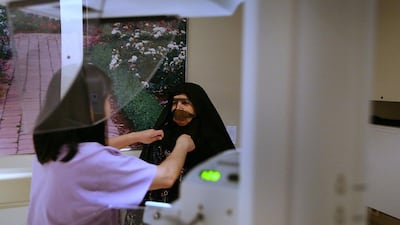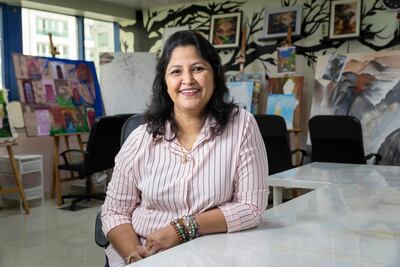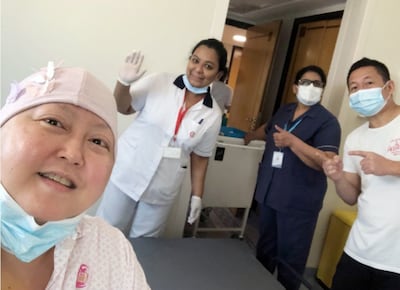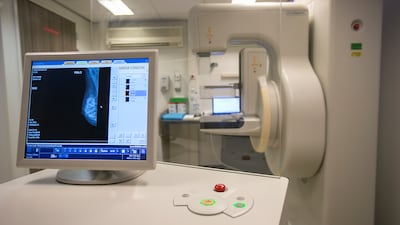Delays to breast screening during the coronavirus pandemic have left some women with a reduced chance of beating cancer.
Doctors at NMC Royal in Sharjah, one of the country’s largest private hospitals, examined fewer than half the normal number of women for breast cancer in 2020.
The unit’s dedicated breast cancer treatment centre typically screens 2,000 women a year for the UAE’s most common form of cancer.
NMC Royal Hospital
“Last year, we screened just under 1,000 patients, which is a big number for the UAE, but considerably lower than what we would usually see,” said Dr Menatallah Tawfik, 40, an Egyptian breast cancer radiologist at the facility.
“Only now are we seeing effect of this, with more women with stage three and four breast cancer who skipped their screening last year during Covid.
“If we had seen them earlier, their breast cancer would have been 100 per cent curable.
“Their chance of recovery is now considerably reduced.”
Dr Tawfik said that, on average, those with stage three cancer had a 50 to 70 per cent survival rate, but 10 to 20 per cent of those with stage four survived.
Stay at home measures and concerns over catching the virus during a hospital visit were blamed as common reasons for fewer women than usual going to be screened.
The trend was reported across NMC hospitals.

At NMC Royal Hospital in Dubai Investments Park, at the height of the pandemic from March until September, 43 women completed a mammogram.
In the corresponding period this year, 63 women were scanned – an increase of about 50 per cent.
It was a similar picture at the provider’s speciality hospital in Al Nahda, where 89 women were scanned for breast cancer from March to September 2020.
As confidence returned in 2021, 107 women were checked in the corresponding period.
In 2019, 821 women presented for a breast ultrasound in 2019, but that number was down in 2020 when 730 checked in for a routine scan.
Dr Tawfik, who recovered from Covid-19 last year, said a national shortage of radiologists was also contributing to delayed diagnoses.
“Breast cancer radiologists are few around the world, maybe less than a thousand,” she said.
“It has taken a lot of personal sacrifice and 15 years of work to be in my position. Not everyone wants to go though this.
“I am one of just five to six breast radiologists in the UAE, and the only one in Sharjah and the Northern Emirates. If there were more of us, more women would have their breast cancers detected earlier.”
It is ten years since Zulekha Hospital launched its Pink it Now cancer awareness programme offering free screenings.
In that time, more than 13,000 women have been checked for breast cancer.
A year before the covid pandemic in 2019, the hospital screened 2,423 women but that number fell dramatically to just 1,446 last year.
Deadly delays to mammograms
It is a familiar scene elsewhere, with UK figures showing close to 12,000 women living with undiagnosed breast cancer.
Screening remains below pre-pandemic levels according to the charity Breast Cancer Now. It said half a million fewer women were screened since checks resumed in the summer of 2020 when compared with the same periods of 2018 and 2019.
Clinical guidance that warrants a cancer referral includes blood in the patient's urine, a breast lump, problems swallowing, anaemia caused by iron deficiency and post-menopausal or rectal bleeding.
One patient diagnosed early was Sri Lankan Thamara Noori, who has fully recovered from stage two breast cancer.

The Abu Dhabi resident was having a shower one morning when she found something unusual on a breast.
“I thought it was just a spot as it was just like a pimple on the outside,” said Ms Noori, 47, whose cancer was diagnosed in 2015.
“I didn’t give it too much thought, but my family forced me to go to the doctor. I said I didn’t want to go. But when I came in from work they had already made the appointment.”
That quick thinking probably saved her life.
Ms Noori was successfully treated at Tawam Hospital in Al Ain and her cancer is in remission.
She said she will always be grateful to her family for insisting she got the spot checked, as it turned out to be a golf ball-sized lump underneath the skin.
“You don’t know what would have happened if I had just ignored it or I didn’t mention it,” Ms Noori said.
“As women, we don’t think of ourselves. We put our families first or we put something we have to do before everything else. So we come last.
“But this is a huge mistake. If we are stable and healthy we can take care of the rest.”
A curable cancer

Breast cancer is the most common cancer type diagnosed in the UAE, responsible for 21.4 per cent of all cancers.
About 85 per cent of breast cancers occur in women who have no family history of the disease. These occur because of genetic mutations that take place as a result of the ageing process, rather than inherited mutations.
Those with a family history of the disease are likely to carry the BRCA1 or BRCA2 gene mutations, which cause 5 to 10 per cent of breast cancers.
On average, women with a BRCA1 mutation have up to a 72 per cent lifetime risk of developing breast cancer. For women with a BRCA2 mutation, the risk is 69 per cent.
Mary Joy Villanueva Balagot, 51, is another woman who was given a new lease of life thanks to a routine check-up.
Ms Balagot, a former smoker, felt a lump in her left breast in June 2020, but did not get herself checked out until March this year by Dr Sai Babu Jonnada, a consultant oncologist at NMC Royal Hospital in Sharjah.
She has since had a mastectomy to remove her cancerous breast and endured 16 chemotherapy sessions.
“Dr Sai helped me with my journey of treatment and recovery throughout,” said Ms Balagot, whose treatment was paid in part by a charity, as her insurance did not cover the full costs.
“Most importantly he helped me deal with my stress as I became emotionally drained in between treatments.
"I am grateful to him for his understanding of not only the disease but also of the emotions of a troubled soul, playing behind the scenes.”
To book a free breast cancer screening, visit https://zulekhahospitals.com/pinkitnow/ or call 600 52 4442.

